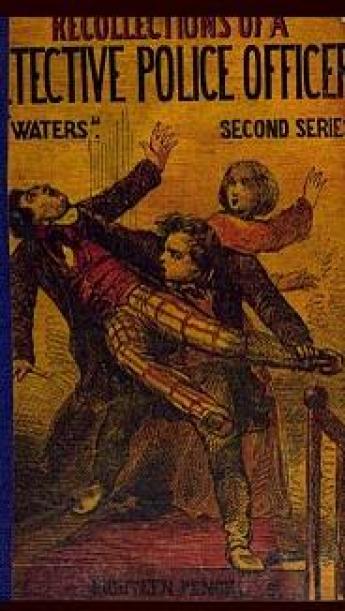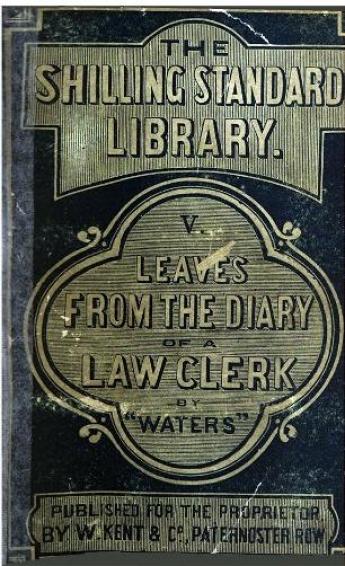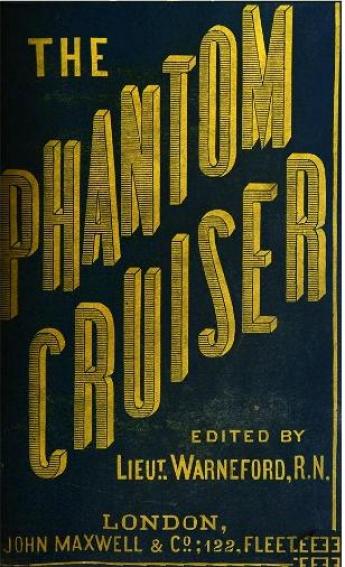Antiquarian Booksellers' Association Ash Rare Books
Collecting Rare Books and First Editions - Mysterious Waters
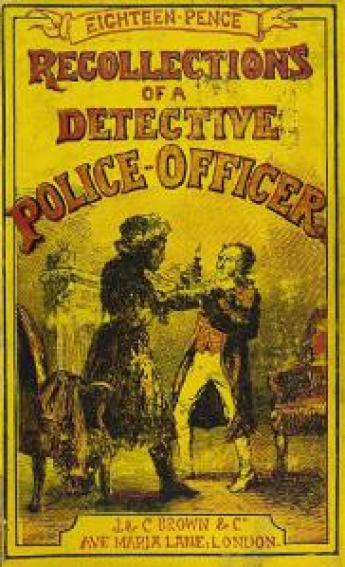
By Laurence Worms
“I returned to Scotland Yard to report …” – an opening to a sentence which anywhere in the English-speaking world can only mean one thing – that we are about to enter the realm of that peculiarly English, much-loved, and perennially popular school of detective fiction based on the exploits of the ‘Detective Branch’ of the Metropolitan Police, originally established in 1842 with a complement of just two inspectors, six sergeants and a number of constables. It became ‘Criminal Investigation Department’ in 1878.
This particular sentence in fact comes from a story published in Chambers’ Edinburgh Journal in August 1849 as the second in an irregular series which ran between 1849 and 1852 under the general title of Recollections of a Police Officer. And they are the very first detective stories in English literature – the word ‘detective’ itself (according to OED) only used as a noun in English from 1850 – in these stories the earliest formulation is invariably ‘detective-officer’, before mention is made of a ‘brother-detective’ in 1851.
We know of course that there are earlier fictions with claims to priority as tales of detection – stories in Chinese, in Arabic, Voltaire’s Memnon (1747 – better known as Zadig, ou, La Destinée), William Godwin’s Things As They Are, or, The Adventures of Caleb Williams (1794), the anonymous Richmond; or, Scenes in the Life of a Bow Street Officer (1827) and above all, of course, the three stories published in the USA by Edgar Allan Poe and featuring the amateur sleuth C. Auguste Dupin – The Murders in the Rue Morgue (1841), The Mystery of Marie Rogêt (1842) and The Purloined Letter (1844). All honour to them, they make their own case, but deep in our English hearts we know there is only one proper sort of detective – the Man from the Yard – and it is only with these modest tales in Chambers that we reach the real thing – the first professional detective in English fiction.
Ten of these stories were subsequently published in unauthorised editions in New York in 1852 and 1853, under the title The Recollections of a Policeman. All eleven, plus a twelfth which had not appeared in Chambers, were then published in London as Recollections of a Detective Police-Officer in 1856, with a second series of eight further stories added in 1859.
The stories purport to be the reminiscences of a genuine detective. He is called Mr Waters – just plain Waters to his superior officers. He has no first name, although his American publishers had for some unknown reason christened him Thomas, and the ‘authorial’ prefaces to the English editions are signed C. W. His first appearance in Chamberspreceded the Inspector Bucket of Dickens’ Bleak House by some years and the Sergeant Cuff of Wilkie Collins’ The Moonstone by many more. The stories are the work of a journalist named William Russell, the inventor of the first Scotland Yard detective in fiction. Pause for a moment. Reflect on this. Think of all the legions of his successors. See how many you can name off the top of your head. Consider our library shelves and our television schedules past and present shorn of these stock figures and how very different our popular culture would be without them. It is difficult to overstate the importance of this.
One might have thought that this priority would have brought Russell some measure of fame and a modicum of fortune. A knighthood might not have been amiss – such after all was the reward of another Victorian journalist, his namesake and contemporary Sir William Howard Russell of The Times, by most measures the first modern war correspondent, present in the Crimea and at the relief of Lucknow. Surely there will be an entry for Russell in the Oxford Dictionary of National Biography – maybe a Wikipedia entry at the very least. But no – Russell, the progenitor of the English detective story, has none of these things.
His priority in these matters has been known and understood at least since John (Jake) Carter’s New Paths in Book Collecting exhibition at Bumpus in 1934, where the English book editions were displayed, but when Eric Osborne, who had first written about Russell in 1932, came to write an introduction to a facsimile reprint of the 1875 collected edition for the Covent Garden Press in 1972, he could find only this to say:
“In searching for biographical details of William Russell for the present foreword, I found a mystery almost as baffling as any of his ‘Waters’ assignments. Even the British Museum Catalogue, which goes to great lengths to differentiate authors with fairly common names, could find no more to say of him than ‘miscellaneous writer’. I could not find his birth and death dates and no reference book offered any details”.
This remains the case. Until now, that is – remember that you read it here first. There are still huge gaps to fill in and more strenuous research required, but here is Russell on the 1851 Census return – just at the time the stories were appearing in Chambers: he is described as a married man aged forty-six, born in Southampton and now living at 9 Southgate Place, West Hackney, by profession an author, a “Writer for Chief Periodicals” to be precise. His wife, Eliza, aged thirty-eight, was also originally from Southampton – and the household was completed by a young housemaid named Harriet Thorndyke (rather an appropriate name in a crime-writer’s house).
William Russell is a common name, and whether this makes him the William Russell who was baptised at Millbrook on the outskirts of Southampton on 25th May 1806, the son of Joseph and Elizabeth Russell, is not certain, although this is the only likely candidate I have found. Whether he was the William Russell who married Eliza Sherry at All Saints, Southampton, on 27th November 1830 – the bride baptised on 12th January 1812 at the same church – is also far from certain, but the names, dates and places are a pretty good fit.
I can find no trace of Russell on the 1861 Census returns, but by 1871 he was a widower, lodging in the house of a diamond-setter at 9 Caledonia Street, just across the road from King’s Cross Station, now described simply as an author born in Southampton. His age appears to be given as fifty-eight, but the record is faint and it may actually read sixty-eight: he may also have docked a few years from his real age to make himself more acceptable as a lodger – or his age may simply have been a polite but complete guess on the part of the householder in answer to the census enumerator’s question. Discrepancies of this sort are legion.
He was probably the William Russell whose death at the age of about seventy-two was registered at Islington (which would have been the registration district for Caledonia Street) in the final quarter of 1876 – but, yet again, this would require further confirmation.
The barest bones of a life, but something at least for future researchers to build on. But what of the stories themselves? Russell was I think acutely aware of the novelty of what he was doing and the opening up of perhaps unfamiliar moral and fictional landscapes. His preface to the 1856 collection is anxious to make a case for the honour and courage of this new breed of ‘peace-officers’, although they are not conventional heroes of the battlefield. He is anxious too to defend the ‘stratagems and disguises’ employed by the detective-officers, apparently recently rebuked by a judge, as legitimate ‘ruses de guerre’, squarely addressing a distinctly felt English unease at anything smacking of professional spies or unsporting ways. He is also still unsure enough of his audience to seek to stress that the stories will in no way encourage anyone in pursuing a criminal vocation. A final necessary assurance is that the stories do not contain a single line that might ‘raise a blush on the most sensitive cheek’.
The scene set, Waters introduces himself – a man brought down in the world by adversity, “chiefly the result of my own reckless follies”, and compelled to join the Metropolitan Police “as the sole means left to me of procuring food and raiment”. His success in capturing “the perpetrators of an artistically-contrived fraud”, brings him to the attention of a senior officer, who hints at some knowledge of his previous life and misfortune. Waters is instructed to don plain clothes – the birth of the fictional plain-clothes officer – to interview a dowager lady and then to infiltrate a gang of “blacklegs, swindlers, and forgers”. Patience and a cool head bring success and with it the added pleasure of bringing to book the man responsible for his own downfall.
These aren’t of course fully polished examples of the classical whodunit – we would not expect it. But ruses, stratagems and disguises there are, as well as bafflement and patient procedure. Waters’ work is as often to prove the innocence of someone against whom the evidence is overwhelming (he relies much on instinct as to guilt or innocence) as to solve a mystery without obvious clues. The prose is sometimes both arch and prolix in the Victorian way (both G.P.R. James and Bulwer Lytton are mentioned in one story), the women too often given to simper and swoon (although often showing more adroitness, verve and resilience than the men), but the dialogue is often strong and authentic sounding, with some persuasive slang (‘hush-money’, ‘the rhino’ – both terms of greater antiquity than might be supposed). There are distinct flashes of humour, often self-deprecating. There is perhaps too much reliance on coincidence and chance recognition. Credulity is sometimes stretched – Waters’ casual employment of a young wastrel who turns out to be both a superlative actor and an outstanding ventriloquist raises an eyebrow, but the stories rattle along, they entertain, they amuse – and the best of them would readily translate into a popular period television series.
Russell is thoroughly at home and at ease in his milieu and went on to make a career of this kind of writing. A familiarity with the niceties and absurdities of the law, together with an undisguised contempt for its more incompetent and slovenly practitioners, inclines me to think that his journalistic experience must have included some time as a court reporter. This is an impression reinforced by his Leaves from the Diary of a Law-Clerk, advertised as being by the author of Recollections of a Detective Police Officer, published in 1857 and in its way perhaps just as original – a forerunner of the courtroom drama. It’s written with verve and wit – tales of an heiress bilked of her fortune until a dramatic intervention in court, or of a temptress who could get away with murder – and does. In this context, it is interesting to note that Professor Stephen Knight of Melbourne on his personal blog (1st February 2013) has suggested that Russell may also have been the author of the similar stories collected in The Experiences of a Barrister by S*** ****** ******, D.C.L. (1856).
To judge from its use in future advertising, Recollections of a Detective Police-Officer was plainly Russell’s most successful work – it was translated into both German and French and spawned numerous imitations – and it was a genre to which he would return. The Experiences of a French Detective Officer appeared in 1861 and Undiscovered Crimes in 1862. Experiences of a Real Detective by Inspector F, a collection of eleven stories, also appeared in 1862. Allegedly edited by Waters, the opening is by now more confident: “‘Detective’ literature, if it may so be called, appears to have acquired a wide popularity, chiefly, I suppose, because the stories are believed to be, in the main, faithfully-told, truthful narratives. I have read them all and need hardly say have discovered mistakes which proved to me that the best and most popular of them were the handiwork of a literary man, not the record of an actual experience …”. Urged by friends to record his genuine experiences, the inspector makes the acquaintance with a “gentleman who writes for the best of the London periodicals”, who promises to assist in their publication. Russell appears to have forgotten by this stage that his alter ego Waters was a detective and not a journalist – and the reappearance of the ventriloquism motif in one of the stories rather settles their fictional nature.
Autobiography of an English Detective appeared in two volumes – sixteen stories – in 1863. Although again attributed to Waters on the title-page, the autobiographical detective is now called Clarke. The opening story, A Detective in the Bud, is, like many of these tales, set in a period prior to the setting up of the Detective Branch, in this case as early as 1819. Forced at the age of fifteen by his step-father to join the Metropolitan Police – “only the name of which is modern, the vocation itself being as old as corrupt, civilized and uncivilized humanity” – the young Clarke, disgusted at his situation, finds himself embroiled in the hunt for a radical on the run after the Peterloo Massacre, a man whom Clarke has both personal and political reasons for not wanting to find – Russell is entirely capable of surprise, real tension and forthright social commentary. In the event, the novice policeman both shelters and helps the radical escape – and is then blackmailed by another prisoner into allowing him to escape as well. A dramatic if not auspicious start to a detective career.
A number of other works appeared under the Waters pseudonym, most notably The Game of Life (1857) – later republished under the title Leonard Harlowe – a first-rate piece of work, a really cracking tale of a breathtaking and audacious Victorian identity theft. There was also work which came out under Russell’s own name –Extraordinary Men : Their Boyhood and Early Life(1853), followed by Extraordinary Women : Their Girlhood and Early Life (1857); Eccentric Personages(1864), Leaves from the Journal of a Custom-House Officer (1868), etc. And, if that were not enough, there was also a wholly separate sequence of nautical tales published under the pseudonym of Lieutenant Robert Warneford R.N. – Tales of the Coast Guard (1856), Tales of the Slave Squadron (1860), Running the Blockade(1863) – this a fascinating and absolutely topical glimpse of the American Civil War through cotton-starved English eyes – The Phantom Cruiser (1865) and others.
This is a man who deserves rather more attention. In My First Trip across the Atlantic, one of the stories in Autobiography of an English Detective, we meet a new character: “I knew that he was a gentleman of the press, a writer of books, and if I did not misunderstand him, had written or concocted, whichever may be the right term, pantomimes for the stage – Mother Goose, Harlequin Hunchback, or some such nonsense …”. A little later the gentleman of the press turns out to be called – Russell.
***
Published on The Bookhunter on Safari, presented here by permission of the author. Pictures: The Bookhunter on Safari, British Library Board.
